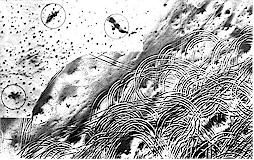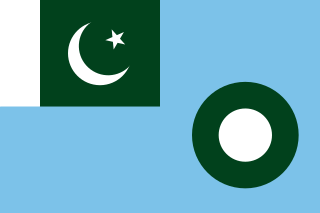
The Pakistan Armed Forces are the military forces of Pakistan. It is the world's sixth-largest military measured by active military personnel and consist of three formally uniformed services—the Army, Navy, and the Air Force, which are backed by several paramilitary forces such as the National Guard and the Civil Armed Forces. A critical component to the armed forces' structure is the Strategic Plans Division Force, which is responsible for the maintenance and safeguarding of Pakistan's tactical and strategic nuclear weapons stockpile and assets. The President of Pakistan is the Commander-in-Chief of the Pakistan Armed Forces and the chain of command is organized under the Chairman of the Joint Chiefs of Staff Committee (JCSC) alongside the respective Chiefs of staffs of the Army, Navy, and Air Force. All branches are systemically coordinated during joint operations and missions under the Joint Staff Headquarters (JSHQ).

The Indian Army is the land-based branch and largest component of the Indian Armed Forces. The President of India is the Supreme Commander of the Indian Army, and its professional head is the Chief of Army Staff (COAS). The Indian Army was established on 1 April 1895 alongside the long established presidency armies of the East India Company, which too were absorbed into it in 1903. Some princely states maintained their own armies which formed the Imperial Service Troops which, along with the Indian Army formed the land component of the Armed Forces of the Crown of India, responsible for the defence of the Indian Empire. The Imperial Service Troops were merged into the Indian Army after independence. The units and regiments of the Indian Army have diverse histories and have participated in several battles and campaigns around the world, earning many battle and theatre honours before and after Independence.

The Indian Air Force (IAF) is the air arm of the Indian Armed Forces. Its primary mission is to secure Indian airspace and to conduct aerial warfare during armed conflicts. It was officially established on 8 October 1932 as an auxiliary air force of the British Empire which honoured India's aviation service during World War II with the prefix Royal. After India gained independence from United Kingdom in 1947, the name Royal Indian Air Force was kept and served in the name of the Dominion of India. With the transition to a republic in 1950, the prefix Royal was removed.

The Battle of Longewala was one of the first major engagements in the western sector during the Indo-Pakistani War of 1971, fought between assaulting Pakistani forces and Indian defenders at the Indian border post of Longewala, in the Thar Desert of Rajasthan. The battle was fought between 120 Indian soldiers accompanied by four Hawker Hunter and three HAL Marut fighter-bombers and 2,000–3,000 Pakistani soldiers accompanied by 30–40 tanks.

The United States Army Space and Missile Defense Command (USASMDC) is the Army Service Component Command (ASCC) for United States Strategic Command and United States Space Command. It was established in 1985 as the Army Strategic Defense Command, responsible for ballistic missile defense. In 1992, it merged with Army Space Command to become Army Space and Strategic Defense Command. In 1997, it became an Army Major Command and was redesignated Army Space and Missile Defense Command.

The Chairman Joint Chiefs of Staff Committee (CJCSC) is, in principle, the highest-ranking and senior most uniformed military officer, typically at four-star rank, in the Pakistan Armed Forces who serves as a Principal Staff Officer and a chief military adviser to the civilian government led by elected Prime minister of Pakistan and his/her National Security Council. The role of advisement is also extended to the elected members in the bicameral Parliament and the Ministry of Defence. The Chairman leads the meetings and coordinates the combined efforts of the Joint Chiefs of Staff Committee (JCSC), comprising the Chairman, the Chief of the Army Staff and Chief of the Air Staff and the Chief of the Naval Staff, Commandant of Marines, DG Coast Guards and Strategic Plans Division, and commanders of the service branches in the Civil Armed Forces and the National Guard.

The Joint Chiefs of Staff Committee (JCSC), ; is an administrative body of senior high-ranking uniformed military leaders of the unified Pakistan Armed Forces who advises the civilian Government of Pakistan, National Security Council, Defence Minister, President and Prime minister of Pakistan on important military and non-military strategic matters. It is defined by statute, and consists of a Chairman, the military chiefs from Army, Navy and the Air Force: all four-star officers appointed by the President, on the advice of the Prime minister. The chairman is selected based on seniority and merit from the Chiefs of service of the three branches of the Pakistan Armed and Defense Services. Each service chief, outside their Joint Chiefs of Staff obligations, performs their duty directly for the Ministry of Defence.

The National Command Authority (NCA) is the authority responsible for safeguarding the national security of Pakistan through command, control and operational decisions regarding Pakistan's nuclear weapons programme.

A space command is a military organization with responsibility for space operations and warfare. A space command is typically a joint organization or organized within a larger military branch and is distinct from a fully independent space force. The world's first space command, the United States' Air Force Space Command was established in 1982 and later became the United States Space Force in 2019.

The Pakistan Navy Special Service Group is the special operations force tasked with the conducting the small-unit based military operations in all environmental formats of the sea, air, and land by adopting to the tactics of the unconventional warfare.

The Chief of the Air Staff is a military appointment and a statutory office held by an Air Chief Marshal in the Pakistan Air Force, who is appointed by the Prime Minister of Pakistan and final confirmation by the President of Pakistan. The CAS is the highest-ranking officer of the Pakistan Air Force and only pilots are appointed in this post.

The Pakistan Army Strategic Forces Command is a strategic and missile formation of the Pakistan Army. Headquartered at the Joint Staff HQ in Chaklala near Rawalpindi, the strategic command controls the land-based ballistics and cruise missile systems—both nuclear and conventional.

The Pakistan Army Special Service Group is the special operations forces of the Pakistan Army. They are also known by their nickname of "Maroon Berets" due to their headgear.

The Pakistan Air Force Strategic Command is one of the major regional formations of the Pakistan Air Force headquartered at the Air HQ in Islamabad.

The Pakistan Navy Strategic Forces Command, is a strategic and missile formation of the Pakistan Navy. Headquartered in Navy HQ in Islamabad, the strategic command controls sea-based guided and cruise missile system— both conventional and nuclear.

The Joint Staff Headquarters, is the military headquarters of the Pakistan Armed Forces at the vicinity of the Chaklala, Rawalpindi, Punjab in Pakistan.

A space force is a military branch of a nation's armed forces that conducts military operations in outer space and space warfare. The world's first space force was the Russian Space Forces, established in 1992 as an independent military service. However, it lost its independence twice, first being absorbed into the Strategic Rocket Forces from 1997–2001 and 2001–2011, then it merged with the Russian Air Force to form the Russian Aerospace Forces in 2015, where it now exists as a sub-branch.

An air force in the broadest sense is the national military branch that primarily conducts aerial warfare. More specifically, it is the branch of a nation's armed services that is responsible for aerial warfare as distinct from an army aviation or naval aviation units. Typically, air forces are responsible for gaining control of the air, carrying out strategic and tactical bombing missions, and providing support to land and naval forces often in the form of aerial reconnaissance and close air support.

The Armed Forces Special Operations Division (AFSOD) is an integrated tri-services division of the Indian Armed Forces. The division is tasked to carry out special operations. The AFSOD draws personnel from all three special warfare branches of the Indian Armed Forces.

The Civil Armed Forces (CAF) are a group of nine paramilitary, uniformed organisations, separate and distinct from the regular "military" Pakistan Armed Forces. They are responsible for maintaining internal security, helping law enforcement agencies, border control, counter-insurgency and counter-terrorism, riot control, and anti-smuggling under the Ministry of Interior. They frequently operate alongside the Pakistani military in response to natural disasters. During times of war they can have their command transferred to the Ministry of Defence, and effectively combined to form a reserve force for the Pakistani military.














